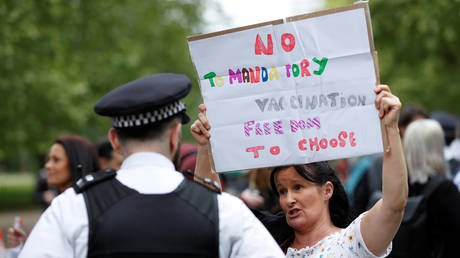
With the Red Cross warning governments to clamp down on a “second pandemic” of misinformation, the organization’s health and care chief told RT that he’s not demanding censorship, but pushing for “positive change.”
The first batches of Covid-19 vaccines are on the cusp of availability, but International Federation of Red Cross President Francesco Rocca said that a “second pandemic” of “fake news” about vaccines might turn the public off getting the jab.
“We believe that the massive coordinated effort that will be needed to roll out the Covid vaccine in an equitable manner, needs to be paralleled by equally massive efforts to proactively build and protect trust,” he told the UN Correspondents Association on Monday.
Whether stemming from concerns about their long-term side effects, skepticism over their rapid development process, or online conspiracy theories, coronavirus vaccines have not inspired widespread confidence. In a quarter of countries his organization surveyed, vaccine acceptance was around 50 percent. Nearly half of US adults say they’ll definitely or probably not take a vaccine, while more than a third of people in the UK will refuse the shot.
Emanuele Capobianco, head of health and care at the IFRC lamed the public’s lukewarm enthusiasm on “fake news” from the “anti-vaxx movement.”
Speaking to RT on Tuesday, Capobianco said that governments and scientists need to work on “correcting misinformation” and convincing the public that vaccines are “effective and safe.”
Capobianco denied that he was suggesting that people be forced to take a vaccine, nor was he asking for a ban on vaccine-skeptic content online. Instead, he said that governments and social media companies should focus on “sharing the right information as widely as possible.” He singled out tech companies as having the potential to be “agents of positive change.”
Yet these companies have explicitly banned vaccine-skeptic content. YouTube, Facebook and Twitter have all partnered up with governments to fight “the wave of false claims” surrounding the virus, with Facebook and YouTube both removing “misinformation” on the disease and vaccines.
Of course, any effort to limit the spread of vaccine “misinformation” runs the risk of backfiring spectacularly. YouTube and Facebook learned this first-hand back in May when they pulled conspiracy documentary ‘Plandemic’ from their platforms. The ban only increased interest in the film, and a book by its subject shot straight into third place on the New York Times’ bestsellers list.
Subscribe to RT newsletter to get stories the mainstream media won’t tell you.




